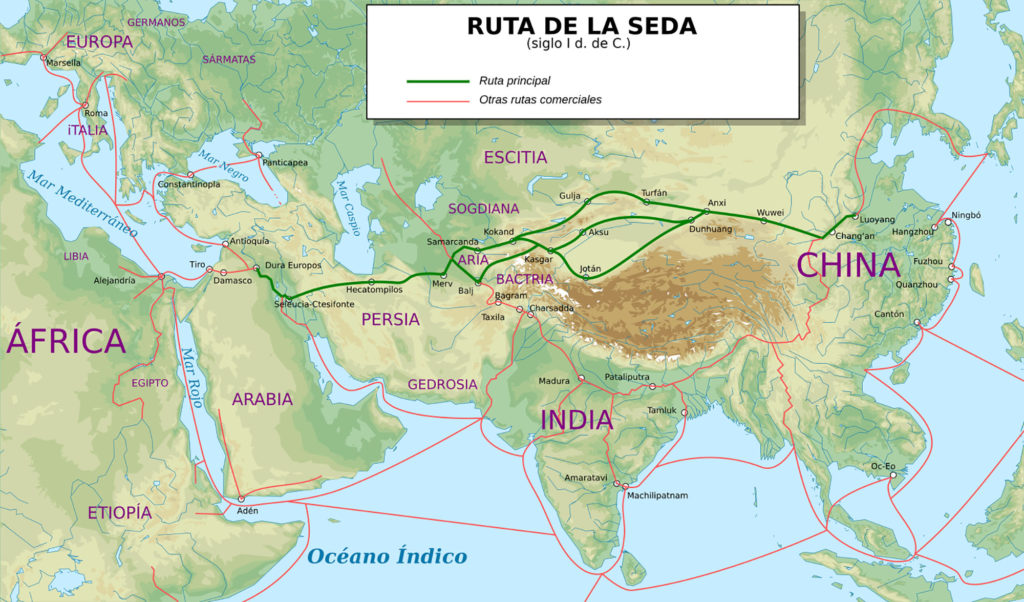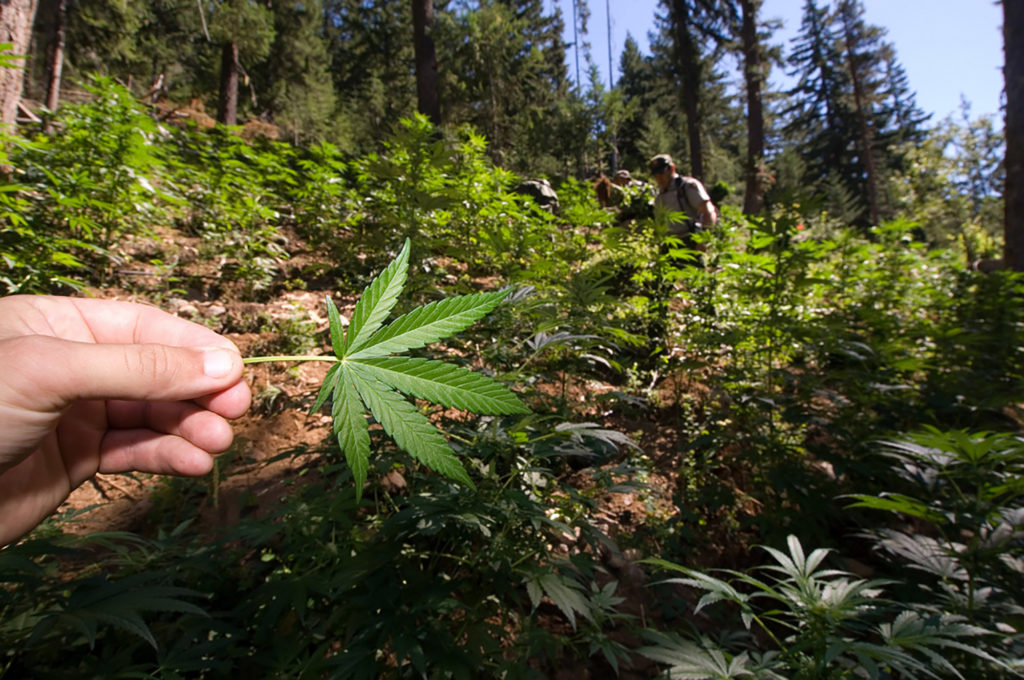The global cannabis export market is dominated by a handful of Canadian, Dutch and British companies. Over 90% of all legal cannabis sales today take place in the USA. Will the world’s traditional cannabis-producing countries get an opportunity to compete in this arena?
Cannabis as a Universal Resource
Cannabis, a crop humans have collectively grown over unknown millennia (at least ten thousand, according to some estimates), and have collectively assisted in selecting, improving and spreading throughout the planet, is by its very nature a collective resource.
Efforts to restrict its trade, ostensibly borne of concern for public health, often turn out upon closer inspection to be economic manipulations to ensure certain parties are enriched at the expense of others.
The current situation in the UK is an example – the nation is now the world’s largest producer and exporter of medicinal cannabis, while the general public suffers under extreme restrictions on access to medicinal cannabis.
The managing director of the country’s largest cultivation operation, British Sugar, is Paul Kenward – his wife Victoria Atkins (“Parliamentary Under Secretary of State for Vulnerability, Safeguarding and Countering Extremism”) has a long track record of strident opposition to cannabis legalization, while her family directly benefits from one of the sole legal licenses awarded in the UK.
It is of the utmost importance to ensure that the great potential value of this shared global resource is distributed among the people in as egalitarian a manner as possible. One of the most crucial steps is to limit the potential power of large multinational corporations; another is to make small-scale cultivation of cannabis for personal use universally legal.
“Globalization” Helped Cannabis Spread in the First Place
The concept underlying the process of globalization (“the development of an increasingly integrated global economy marked especially by free trade, free flow of capital”) is not inherently negative. Improving social, cultural and economic connections between people can have many obvious benefits.
With the right collective approach, downsides – both inherent (loss of cultural and geographical isolation) and sociocultural (the exploitative “tapping of cheaper foreign labor markets”) may potentially be avoided or mitigated.

Globalization is also far from a new phenomenon. For millennia, humans have travelled vast distances, and have set up many lasting trade networks covering huge areas around the world. The Silk Road is an example of a historical and practically global network, stretching for thousands of miles across Asia, deep into Europe and Africa – and lasting for over a thousand years.
The Silk Road is also relevant as it almost certainly facilitated the spread of cannabis from its ancestral heartlands in Central and South Asia to Western Asia, Africa, and Europe.
Cannabis (in the form of seeds, fibres, textiles, oils, ganja and hashish) has been a “globalized” commodity for many centuries, and were it not for such vast ancient trade networks, it would not have spread to such an extent.
Corporate Cannabis – the Next Globalized Industry…
Of course, the Silk Road also enabled the vast Mongol horde of Genghis Khan to pillage its way across Eurasia, routing various armies that stood against it.
In turn, our modern, globalized, highly complex trade networks allow corporations of ever-greater size and power to exploit vast swathes of the planet today – with few checks to restrict their rapacious growth and consumption, a range of highly-advanced technological accoutrements to effectively fulfill their targets, and the support and encouragement of national governments.
These entities have the potential to increase the suffering of the general population, while enriching an ever-tinier elite, to an unprecedented extent.
The cannabis industry is not immune from this effect. Advantages for large corporations almost inevitably lead to disadvantages for small-scale producers, both domestically and internationally.
In California, hundreds of small-scale cannabis producers are at risk of losing their livelihoods as the recent legalization of the recreational market encourages corporate money to flood in.

In both Oregon and California, the surplus of cannabis has driven prices to as low as $100 a pound; dozens of cannabis producers have been put out of business, with the largest and best-funded operations obviously the most able to weather the storm.
Internationally, the rise of gigantic, multinational cannabis companies has begun – and so far, they are exceedingly Western-owned.
The UK, Canada, and the Netherlands are now the world’s largest exporters of legal cannabis; New Zealand, Australia, Israel and Uruguay (all of which are generally considered “Western” in terms of socioeconomic status) look set to join them in the near future.
Cannabis Monopolies Past…
The unique properties of cannabis have spurred governments to restrict its use or sale countless times throughout history. Often, these restrictions have been followed by the government in question exploiting the resulting opportunity to set up monopolies on the trade.
The most egregious examples of this phenomenon arguably took place within the context of European colonialism. However, even prior to this period, pre-colonial Morocco and Ottoman Tunisia were actively offering monopolies on their domestic industries to the highest bidder.
After Spain and France took control of Morocco in 1912, France maintained a monopoly on cannabis until independence in 1956.
Colonialist efforts to control the cannabis trade occurred in the Maghreb (northern Africa), South Africa, and central Africa; further East, in particular in Sri Lanka, Afghanistan, India, Indonesia, Australia and (of course) China, both opium and cannabis were sold under monopoly of the Dutch and British East India Companies.
…And Cannabis Monopolies, Present
Today’s modern economies (generally, mixed economies: quasi-free market capitalism with varying degrees of cronyism and protectionism, and some social programs) encourage the development of huge corporations with monopolistic tendencies.
Checks and balances designed to prevent excessive growth are clearly ineffective – and globalization offers opportunities for monopoly power to be extended to multiple countries, and for a few companies to quickly dominate the global industry.
This situation is playing out yet again with cannabis. The UK perhaps offers the most blatant example of an outright monopoly being granted to a single company (GW Pharmaceuticals, who contracts British Sugar to grow cannabis).
The Netherlands in 2003 granted a monopoly to Bedrocan (a now-globalized corporation with a subsidiary in Canada and a monopoly on exports to at least nine other countries). However, the Netherlands at least grants its citizens the right to grow their own cannabis, as well as permitting retail sales in hundreds of coffeeshops throughout the country.
There are also many examples of countries that severely limit the number of licensed cannabis producers, effectively creating oligopolies (markets dominated by just a few firms).
Examples include Israel, Canada and many countries that have implemented medical-only legislation in recent years. With this trend, legal cannabis is taken out of the hands of the general public and made the property of a small handful of business elites.
Needless to say, restricting access to legal cannabis for the (up to) three hundred million global citizens that regularly use it will do very little to quell the strength of the illegal market.
Are Monopolies Ever The Right Approach?
Uruguay has implemented a state monopoly on cannabis, although its commitment to fixing low retail prices suggest that its aim may be somewhat more altruistic than most other governments. Furthermore, it has included in its national legislation the right for all citizens to grow a certain number of plants for personal use.
However, the current situation is far from perfect. There have been complaints about the quality and variety of cannabis available, and the forty gram monthly limit imposed on each individual – as well as concerns over the requirement to register with the government and submit fingerprints before having access to cannabis.
Government registration for home growers is also required, and so far, just a few thousand of the country’s 3.4 million inhabitants have signed up.
As well as this, Uruguay is actively pursuing plans to export CBD oil as medicine. Its laws do not prohibit the commercial, for-profit export of medicinal cannabis products – and thus, there are also criticisms that the licensed producers are focusing too heavily on the more profitable cultivation of CBD-rich hemp while under-supplying THC-rich cannabis to the local dispensaries.
Powerful Countries Made Anti-Drug Laws, and Powerful Countries Now Break Them…
Almost a century after the first international laws prohibiting cannabis came into force, those same laws are being challenged by a relentless trend towards legalization.
Nine US states now allow recreational sales of cannabis, although cannabis remains illegal at the federal level. The nations of Uruguay and Canada have legalized recreational cannabis sales – Uruguay in December 2013, and Canada in June 2018.
The response from the United Nations and the International Narcotics Control Board (“the independent and quasi-judicial control organ for the implementation of the United Nations drug conventions”) has been fairly weak, and has thus far been limited to some strongly-worded statements.
Uruguay chose to simply ignore the breaking of its treaty obligations, and did not withdraw or seek accommodation; Canada is currently in contravention of the treaty, and it is unclear which path it will take in its future dealings with the UN/INCB. This approach will no doubt influence in turn the course the US chooses to take on national legalization of cannabis in the near future.
Various sources have commented on the fact that Canada’s legalization is likely to generate greater international furore than that of Uruguay, as it is a more globally prominent nation and a member of the G7 group of UN member states. On the other hand, its prominence is likely to shield it from any serious punitive measures.
Canada is also significant for the fact that among all countries with a legal market, they are perhaps most aggressively seeking to expand on an international level. One large medicinal cannabis producer, Tilray, already exports to nine countries with another two planned; another six companies are licensed to export. However, Canada’s aggressive approach may in fact lead to massive oversupply, which will in turn lead to price crashes and bankruptcies.
Traditional Heartlands of Cannabis Disadvantaged Yet Again

Contraventions of international treaties are not to be taken tightly for many countries around the world, some of which have faced repeated economic and military sanctions or international ostracization for breaking UN conventions. The recent breast milk controversy at the UN is a particularly egregious example of how easily powerful countries can bend others to their will with the threat of withholding military aid.
With regards to cannabis specifically, policies to control illegal trade, such as forced eradication programs, still continue in various countries. In general, control of illegal drug production and trade falls on national governments, and drug-producing countries are obliged to carry out eradications or other programs, at the risk of facing punitive measures at the international level – perhaps in the form of withholding military aid.
The upshot is that there are many cannabis-producing countries that are extremely cautious of breaking any international treaties due to past punitive measures. Simultaneously, other more powerful countries are able to break treaties with impunity, setting up industries and profiting from a commodity that traditional producer countries are still restricted from.
Efforts to Address the Imbalance in the Global Cannabis Industry
Of course, the situation remains complex. For example, Colombia has suffered for decades under the most invasive, violent tactics the global War on Drugs has ever been responsible for, and is about to resume its deadly aerial spraying campaigns to destroy a particularly large coca harvest this year – in response to US pressure.
However, Colombia has also pushed forward with efforts to legalize medicinal cannabis and create a legal, regulated market (thus far with a grand total of fourteen license-holders). It also plans to begin exports in 2019 – although by this time, it will be up against powerful, established competition.
Many other traditional producer countries are now rushing to implement modern cannabis industries. India, Sri Lanka, Thailand, Turkey, Lesotho, Zambia, Zimbabwe, Greece, Mexico, Jamaica and several other nations have introduced some form of cannabis legislation in recent years.
However, looking more closely at the ownership of license-holding companies shows that this does not necessarily represent a potential redress of any global imbalance. For example, in Lesotho, the five existing licenses are held by (partly or wholly) US, British and Canadian companies. Three companies are 100% foreign-owned, the remaining two are 30% and 10% foreign-owned respectively.
The Future of Cannabis Around the World
There may be some hope for less economically-developed nations to catch up to their Western competitors on the global market. Many traditional cannabis-producing countries are in the Global South, with favourable climatic conditions for cannabis cultivation and the potential for far lower production costs.
Colombia has highlighted its year-round 12/12 light cycle and stable temperatures as key advantages for cannabis cultivation, as they allow year-round flowering and multiple harvests. India, of course, is one of the world’s ancient heartlands of cannabis – home of possibly unparalleled genetic diversity, and the ideal conditions for dozens of different landrace varieties to thrive.
In comparison, Canada, the UK and the Netherlands are northern countries with short, cool summers and little natural potential to produce cannabinoids. Much of the medicinal cultivation is done indoors, at a prohibitive cost both in financial and environmental terms.
Even so, for traditional producer countries to gain an edge in the global market, it will almost certainly necessitate a war between gigantic corporations. In that situation, small-scale, artisanal producers will be increasingly threatened by the rise of corporations the world over.
- Disclaimer:While every effort has been made to ensure the accuracy of this article, it is not intended to provide legal advice, as individual situations will differ and should be discussed with an expert and/or lawyer.













Cannabis has been recognized by many people around the world because of its good benefits it has and of course it is also known of its legalization issues. Nonetheless, despite of the issues the cannabis is doing its great job which is to help those who has incurable illness. I am hoping that one day cannabis will be recognized as a miracle plant instead of illegal drug that some people hates.
Another great article Seshata! Thank you
Cannabis has been proven by scientific study, and has been known by the government since then and can kill cancer. Cannabis has its benefits though but like any medication it needs to be used in moderation.
Jeff Sessions says good people don’t smoke pot, he and Trump needs to smoke one and chill out.
sessions is 2 busy STEALING EVERYBODY’S PERSONAL PROPERTY AND THROWING MILLIONS MORE INTO PRISON FOR LONGER SENTENCES, He didn’t have time for anything else. Because Good People don’t smoke Marijuana. Per sessions.